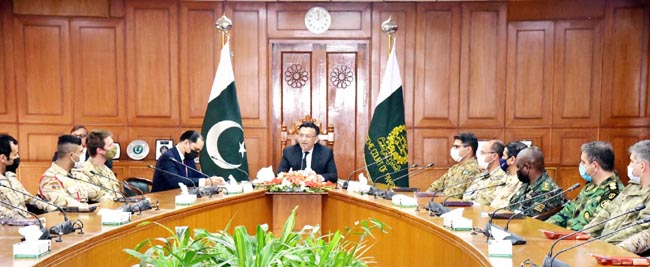ISLAMABAD, April 5: Chief Justice of Pakistan Justice Umar Ata Bandial has declared that the court wanted to wrap up the case by Wednesday (today) and they will try to deliver a verdict the same. The Supreme Court of Pakistan adjourned the hearing of the case until 11:30 am on Wednesday (tomorrow. The five member bench under the chair of Chief Justice Umar Ata Bandial also comprised of Justice Ijazul Ahsan, Justice Mohammad Ali Mazhar, Justice Munib Akhtar and Justice Jamal Khan Mandokhel. The Supreme Court sought National Assembly deputy speaker’s March 31 order and the minutes of the government meetings held on March 31 and April 3 while maintaining that not holding voting on the no-trust motion was not a procedural mistake rather it was a violation of the Constitution. During the hearing of court’s suo moto notice regarding the political situation in the country following deputy speaker’s rejection of no-confidence motion on Tuesday, Chief Justice of Pakistan Justice Umar Ata Bandial summoned the March 31 order of the deputy speaker and minutes of the March 31 and April 3 meetings. The CJP remarked that the rules permit tabling of the no-confidence motion. “The Constitution cannot be made ineffective through the rules,” he added. Justice Umar Ata Bandial, however, declared that the court wanted to wrap up the case by today (Wednesday) and they will try to announce a verdict. A five-member larger bench of the apex court headed by Chief Justice Umer Atta Bandial was hearing the case in Islamabad. Justice Muneeb Akhtar said that in accordance with the Constitution it was mandatory to hold voting on a no-trust motion within seven days. Justice Muneeb asked how can the court interfere in the National Assembly’s proceedings? Justice Jamal Khan remarked that not holding voting on the no-trust motion was not a procedural mistake rather it was a violation of the Constitution. PML-N’s counsel informed the court that if there was a solid reason for deferring the voting beyond the limited period then Article 254 provides protection. “Voting on eighth day will not negate the Constitution,” he declared. Senator Raza Rabbani, representing Pakistan Peoples Party (PPP), told the Supreme Court that a prime minister could not dissolve the assembly after a no-confidence motion had been submitted against him. He said that Prime Minister Imran Khan did not enjoy majority of MNAs’ support on the day voting on the motion was due to take place, but could not take place due to the deputy speaker’s ruling. The PPP’s lawyer went on to add that the National Assembly could not be dissolved until and unless fate of the no-trust motion was decided. “Prime Minister himself had said that the ‘establishment’ had offered him three options,” Senator Rabbani said, and prayed to the court to order voting on the motion. The PPP’s counsel said that he wanted to complete his arguments in the case today so that the court could gave a ‘brief order’ today. Justice Umar Ata Bandial replied that the bench also wanted early conclusion of the hearing, but would give its verdict only after listening to all the parties concerned. Senator Rabbani said it was now for the court to see to what extent the parliamentary proceedings were exempted from court’s scrutiny. “What had happened on that day could only be described as a ‘civilian martial law’,” he opined. The PPP’s lawyer said that the National Assembly, in its session dated March 28, 2022, had given a green signal to voting on the no-confidence motion on April 3. Raza Rabbani said this is a civilian coup. “A stance was created through an alleged cable which is based on mala fide intent,” he said, adding the no-confidence motion against the prime minister was tabled on March 28 but the NA session was adjourned. He maintained that Deputy Speaker Qasim Suri gave the ruling without putting the documents before the parliament on Sunday. He argued that Rule 28 says the deputy speaker cannot give a ruling even if he has the authority. – DNA
- Latest
- Trending





